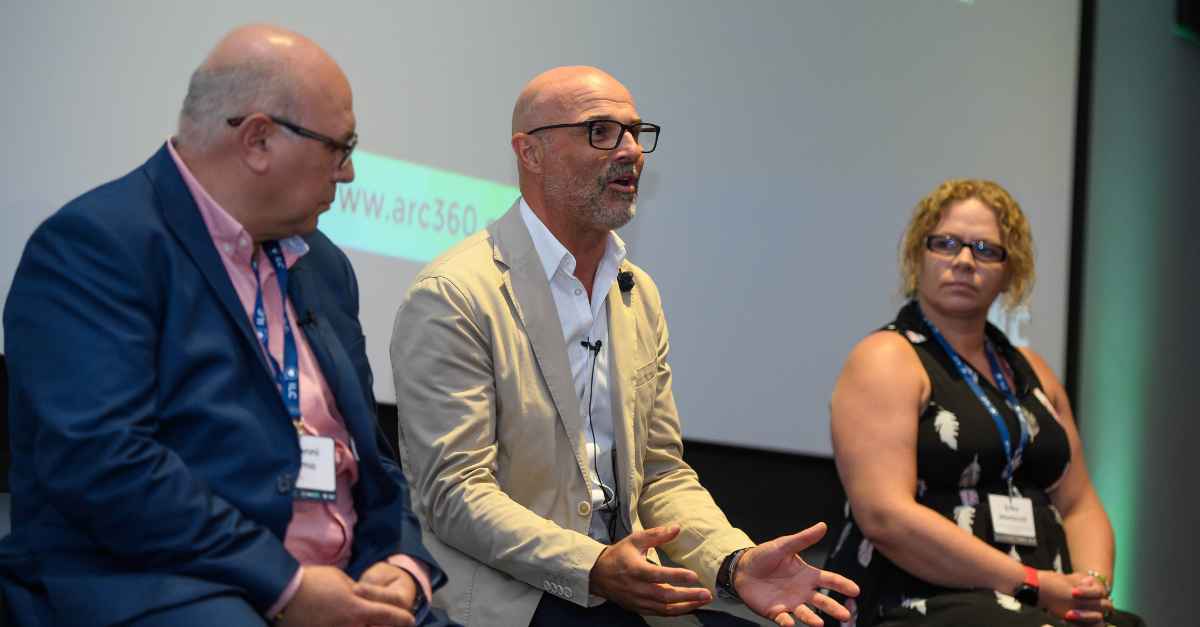Opinion within the industry remains divided on both the practicalities of repairing EVs and their long-term future.
While some believe electrification of the car parc is inevitable and repairers need to ready themselves now, others suggest the technology may yet be usurped by an alternative and that reshaping their businesses around EV repairs is expensive and unrealistic.
Dave Sargeant, Managing Director, Gemini, Erika Woollacott, Managing Director, Fix Auto Devon and Fix Auto Newton Abbot, and Gio Adamo, Senior Engineer, Zego Insurance, took part in an honest and frank debate, Realities of EVs, at ARC360’s specialist EV event, EV-olution, at the Manufacturing Technology Centre, Coventry.
Sponsored by Thatcham Research and and Control€xpert, with the support of other ILC Corporate Partners and Partners, the event explored the impact of EVs on the industry and the challenges posed by their burgeoning uptake.
Dave said, “A few people have said the average repair costs of EVs are similar to petrol and diesel. I don’t think they are at all. Not if you take into account the investment in training and equipment. You’re paying up to £40,000 just to get the tooling, so repairing an EV is a huge cost and I think insurers need to be aware of that.”
Safety
Apart from cost, he also said there still remains real issues around their safe repair. He said that not all manufacturers have made repair methods freely available – “The methods just don’t exist,” Dave said – while the accepted safety protocols are sometimes impossible to adhere to.
For example, bodyshops have been advised to keep EVs away from other vehicles and buildings to mitigate fire risks, but Dave said that very few bodyshops have the space for that.
“It’s not practical,” he said. “Are we meant to park them down the street? And repair processes are different for EVs too. A VDA needs to speak to a level 3 trained technician before he even goes out to the car, and then how do you move the car around the shop when it’s turned off? Or do we bring the spraybooth to the car?
“Maybe it’s a brilliant opportunity to change every process in our shop, but until EVs reach saturation point we’re going to have some Gemini sites capable of doing everything on them, and others that won’t touch them. Petrol and diesel will still be around for a long time. They will still be the bulk of our work for a long time.”
It’s not just bodyshops having to work differently. Processes are also changing for insurers.
Gio explained, “Most of our work is done remotely, but communication at the point of FNOL is key. The amount of information we need to take now is so much more than it used to be. We want to know where the vehicle was hit, the level of damage, secondary damage, how many people were in the vehicle, and if there was any impact to the underside of the car. We can then pass that information on to repairers so they know what they’re dealing with. The more information you have, the better choices you make.”
Investment
But can businesses justify the investment? Volumes dictate that, and while EV sales have soared in recent years, uptake has not moved at the same rate throughout the country, with the bulk of sales in the South East.
Erica said, “We’re not seeing many EVs at all. We’ve had 12 in the last 12 months, yet we have to be geared up and ready to deal with them. We’ve undertaken the Thatcham Research EV Ready process so everyone in our business is EV aware, and we’re training our staff and giving them the opportunity to deal with new technologies, but that also means we’re giving them the opportunity to be poached.”
Taking into account facilities, training and equipment, the level of investment required to repair EVs is not insignificant, and bodyshops, already facing unique challenges, need to be sure the technology is here to stay. But not everyone is 100% convinced.
Erica said, “We’re being asked to invest an awful lot into EVs, but will we have other technologies coming? It’s really difficult to know what the future holds. The one thing everyone does need to have is agility. You need to be prepared for whatever is coming.”
ARC360’s specialist EV-olution event was sponsored by Thatcham Research and ControlExpert, along with ARC360 Corporate Partners: BASF, CAPS, Copart, Entegral, Enterprise, Mirka, Nationwide Vehicle Recovery Assistance, S&G Response, and Solera Audatex, and Partners: Gemini Accident Repair Centres, Repairify, and Prasco UK.

















